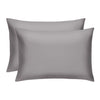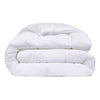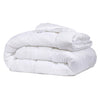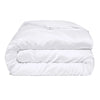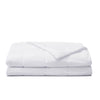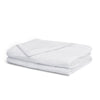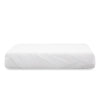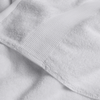The Daily Miracle
Sleeping Without a Pillow: Benefits & Risks
Published
February 20, 2024
Author
Bridget Reed

Exploring various sleep habits opens up a world of intriguing possibilities aimed at enhancing our rest. If you feel like you’d be more comfortable sleeping on a flat surface — or if you’re already exploring the idea of sleeping on the floor — then the potential impact sleeping without a pillow might have on the quality of your sleep in your overall well-being may be significant.
It's a simple tweak to our nightly routine, yet it invites us to question how such a change could influence the way we rest. This exploration delves into understanding the nuances of our sleeping positions, whether we're side sleepers, stomach sleepers, or back sleepers, and how these preferences align with our body's natural needs for a good night's sleep.
What Are the Benefits of Going Without a Pillow?
While snuggling into your favorite plush pillow may be appealing, it’s worth exploring the idea of going without. Although unconventional, depending on how you sleep and your needs, it might be a simple change that comes packed with a bunch of potential perks for your sleep and health.
Sleeping without a pillow could be a game-changer if you've ever woken up with a stiff neck or a sore back. It allows your spine to lie in a more natural, straighter line, which might just be the solution you've been looking for to ease that discomfort.
It's all about getting back to basics and letting your body rest in a position that's more in tune with its natural alignment. For those who toss and turn trying to get comfortable, especially the stomach sleepers among us, ditching the pillow could mean saying goodbye to waking up with that awkward kink in your neck or that annoying shoulder pain.
Back sleepers might find that without a pillow, their head, neck, and spine can align perfectly flat, possibly helping with common annoyances like snoring or even nighttime heartburn. And it's not just about the bones and muscles — sleeping pillow-free can also mean a fresher, cleaner bed.
Pillows can be a playground for dust mites and a collection spot for allergens, so cutting them out of the picture could help you breathe easier and keep those allergy symptoms at bay. Plus, your skin might thank you, too.
Without the constant pressure of a pillow against your face, you could see a reduction in breakouts and those pesky sleep lines. Making this decision is really about listening to your body and maybe even getting closer to that elusive, perfect night's sleep.
With the right mattress, you can explore this pillow-free journey comfortably, discovering firsthand the balance between a casual change in your sleep setup and its potential to improve your night-time rest and overall health.
What Are the Downsides?
Embracing the pillowless sleeping trend has its charm, but it's not a one-size-fits-all solution. Jumping straight into it can lead to a bit of a rough start. Some folks might find the transition a tad uncomfortable as their bodies get used to a new way of resting.
Especially for those dealing with specific health issues like obstructive sleep apnea or chronic conditions affecting the neck and back, skipping the pillow might do more harm than good, amplifying discomfort instead of easing it. Because of this, if you have certain medical conditions related to sleep health or breathing, it’s a good idea to seek medical advice from a healthcare professional first.
That said, if the cons of sleeping without a pillow outweigh the pros for you, but you still want better sleep, spend some time looking for the best pillow for you. You want to feel like your spine is in a neutral position, allowing it to rest in its natural curve.
The way you sleep can substantially impact this, whether you’re prone to stomach sleeping, side sleeping, or you’re looking for more support for your upper back.
How To Make the Transition
If you're curious about testing the waters with pillowless sleeping, there's a smooth way to approach it. The key is in the preparation, like setting the stage with the right mattress that cradles your body just so, matching your sleep style.
Think about giving a memory foam mattress a whirl, as it can offer a supportive embrace even without a pillow, contouring your body's natural lines for a comfy night's rest. Before you go all in, consider easing into it with a thinner pillow or a neatly folded blanket under your head. This way, you're not going cold turkey on your pillow but rather giving your body a chance to slowly adapt to a new sleeping elevation.
Keeping an eye on how you're feeling and how well you're sleeping during this experiment is crucial. It's all about finding that sweet spot where you're comfortable and rested without waking up feeling like you've been in a wrestling match with your bedding.
But What If You Like Your Pillow?
If the idea of parting ways with your pillow doesn't sit right with you, that's perfectly fine. There's no one-size-fits-all when it comes to sleep, and if your current setup is serving you well, shaking things up might not be necessary.
Whether you're a side sleeper needing that extra neck support, a back sleeper aiming for spinal alignment, or anyone in between, maintaining a sleep posture that feels right is key. Many of the benefits of sleeping without a pillow are related to back pain or neck pain.
If you’re not experiencing that, there may be no reason not to use pillows. However, enhancing your sleep hygiene and reaping some benefits similar to those of going pillow-free is still within reach with a simple switch to Miracle Made® Pillowcases.
Infused with antimicrobial silver, Miracle Made® Pillowcases work wonders by keeping you at the ideal temperature throughout the night, reducing those disruptive night sweats and promoting a more comfortable sleep. With their ability to prevent up to 99.7% of odor-causing bacteria growth, you'll enjoy fresher, cleaner bedding that requires up to three times less laundry.
And if you are experiencing lower back pain or are worried about acid reflux, which may be exacerbated by a thin pillow or going without, there are other solutions beyond getting rid of your pillow.
Try checking out the different types of pillows to find the right pillow for you. Pay attention to your spine alignment. If you’re using a thick pillow, for instance, it might be moving the curvature of your spine into an unnatural position, straining your neck muscles and even potentially blocking your airway.
The Bottom Line
Opting to ditch your pillow can open up a new chapter in your sleep journey, offering a fresh take on how to catch those ZZZs in a way that might just elevate your rest and soothe those pesky physical aches.
But like any good story, it's got its twists and turns. Walking into this change with your eyes open, weighing the pros and cons, is the way to go. It's about tuning into your body's signals and maybe getting a bit of professional guidance to navigate any health hurdles.
Listen to your body, seek advice when needed, and who knows? You might just find that going pillowless is your ticket to waking up feeling refreshed and ready to take on the day.
Sources:
Antibacterial Silver | National Library of Medicine
Is Your Pillow Hurting Your Health? | Harvard Health Publishing
Good Sleeping Posture Helps Your Back | University of Rochester Medical Center


